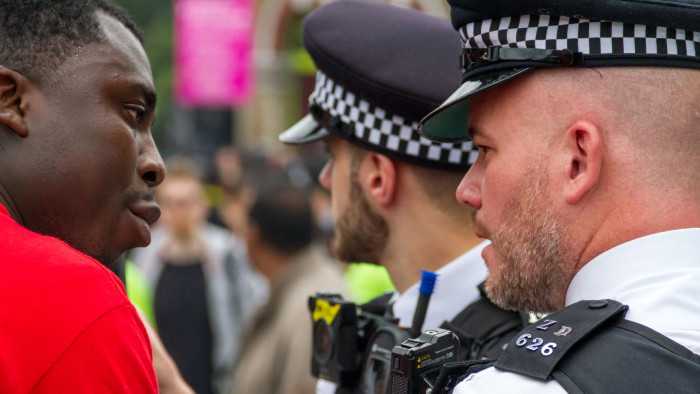
On this page
Fair Trials has responded to the Race Action Plan, published by the National Police Chiefs’ Council and the College of Policing on May 24. The Action Plan, prompted by the murder of George Floyd in 2020 and the mass protests that followed, sets out the commitment of the Chief Constables for England and Wales to create an “anti-racist police service” and to “improve policing for Black people”.
Fair Trials’ Legal Director Bruno Min said:
“If the police are as serious as they claim to be about being an anti-racist institution, they must acknowledge institutional racism. Failing to do so means that they will not address the root causes of racism in policing.
“So while the Police Race Action Plan sends out positive-sounding messages about promoting diversity in the workforce and better community engagement, it fails to recognise overcriminalisation and excessive police powers as key drivers of endemic racism in the criminal justice system.
“In particular, the police’s commitment to address racism in the use of stop-and-search powers seems all but hollow, when at the same time, legal restrictions on these ineffective and discriminatory police powers are being eroded.”
Key points in the Action Plan
In the Action Plan, the NPCC admit they are “ashamed” that “policing still contains racism, discrimination and bias” and even reference the 1998 Macpherson inquiry, which classified the Met as institutionally racist following the tragic murder of Stephen Lawrence. Despite this however, the plan does not acknowledge that institutional racism in policing exists.
The plan sets out four areas of work with a vision for a police service that is “anti-racist and trusted by Black people” and vows that a new approach won’t make Black people feel under-protected or over-policed but involved and represented within the force.
The document details a new approach to tackle racial disparities in the use of force and powers, which includes already discriminatory stop and search practices. They confirm that Black people are stopped and searched at a rate seven times higher than white people, and vow to address this disproportionality.
However earlier this year, the Government recently extended stop and search powers through the Police, Crime Sentencing and Courts Act and more recently lifted restrictions on how the police use stop and search powers under Section 60 of the Criminal Justice and Public Order Act, which will undoubtedly have a disproportionate impact on racialised communities.
The plan also vows to assess and reduce the use of Taser. Last year police drew or discharged Tasers on Black people at a rate six times higher than white people. However, just last week the Government announced plans to allow volunteer police to be armed with Taser stun guns. This dangerous development in police powers will pose serious risk to the public, especially people of colour.
Fair Trials is calling for systemic change that will address racism across the UK’s criminal justice system. Min added:
“We don’t need yet more commitments, guidance, studies, or training programmes that may or may not work. We need concrete action to rein in already excessive police powers, and alternative visions for public safety and justice that are centred around addressing the needs of local communities through appropriate assistance and services.”


